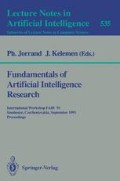Abstract
Possibilistic logic is basically a logic of uncertainty, but a significant fragment of it can also be seen as a logic for the representation of constraints with priorities. The gradation of inconsistency enables the definition of the "best" model(s) of a "partially inconsistent" set of possibilistic formulas. Many formal results have been proved for this fragment of possibilistic logic, including its axiomatisation. Besides, there are some well-adapted automated deduction procedures. Min-max discrete optimisation problems, and more generally problems with prioritized constraints, can be translated in this logical framework, and then solved by its automated deduction procedures.
Preview
Unable to display preview. Download preview PDF.
References
Borning A., Maher M., Martindale A., Wilson M. (1989) "Constraint hierarchies in logic programming", Proc. ICLP'89, 149–164.
Descotte Y., Latombe J.C. (1985), "Making compromises among antagonistic constraints in a planner", Artificial Intelligence, 27, 183–217.
Dubois D., Lang J., Prade H. (1987) "Theorem proving under uncertainty — A possibility theory-based approach". Proc. of the 10th Inter. Joint Conf. on Artificial Intelligence (IJCAI 87), Milano, Italy, 984–986.
Dubois D., Lang J., Prade H. (1989) "Automated reasoning using possibilistic logic: semantics, belief revision and variable certainty weights". Proc. of the 5th Workshop on Uncertainty in Artificial Intelligence, Windsor, Ontario, 81–87.
Dubois D., Lang J., Prade H. (1991) "Fuzzy Sets in Approximate Reasoning. Part 2: Logical approaches", Fuzzy Sets and Systems 40 (1), 203–244.
Dubois D., Prade H. (1982) "A class of fuzzy measures based on triangular norms. A general framework for the combination of uncertain information", Int. J of Intelligent Systems, 8(1), 43–61.
Dubois D., Prade H. (1988) (with the collaboration de Farreny H., Martin-Clouaire R., Testemale C.) "Possibility Theory: an Approach to Computerized Processing of Uncertainty". Plenum Press, New York.
Dubois D., Prade H. (1987) "Necessity measures and the resolution principle". IEEE Trans. on Systems, Man and Cybernetics, 17, 474–478.
Dubois D., Prade H. (1991) "Epistemic entrenchment and possibilistic logic", à paraître dans Artificial Intelligence.
Dubois D., Prade H., Testemale C. (1988) "In search of a modal system for possibility theory". Proc. of the Conf. on Artificial Intelligence (ECAI), Munich, Germany, 501–506.
Froidevaux C., Grossetête C. (1990) "Graded default theories for uncertainty", ECAI 90, Stockholm, 283–288.
Gärdenfors P., Makinson D. (1988) "Revision of knowledge systems using epistemic entrenchment", in M. Vardi ed., Proc. Second Conference on Theoretical Aspects of Reasoning about Knowledge (Morgan Kaufmann).
Ginsberg M.L. (1988) "Multi-valued logics: a uniform approach to reasoning in artificial intelligence". Computational Intelligence, 4, 265–316.
Hooker J.N. (1986) "A quantitative approach to logical inference", Decision Support Systems 4, 45–69.
Jeannicot S., Oxusoff L., Rauzy A. (1988) "Evaluation sémantique: une propriété de coupure pour rendre efficace la procédure de Davis et Putman". Revue d'Intelligence Artificielle, 2(1), 41–60.
Lang J. (1990) "Semantic evaluation in possibilistic logic", Proc. of the 3rd Inter. Conference on Information Processing and Management of Uncertainty in Knowledge-Based Systems, Paris, 51–55.
Lang J. (1991) "Logique possibiliste: aspects formels, déduction automatique, et applications", PhD thesis, University of Toulouse (France), January 1991
Nilsson N. "Probabilistic logic". Artificial Intelligence, 28, 71–87.
Purdom P.W., "Search rearrangement backtracking and polynomial average time", Artificial Intelligence 21, 117–133.
Satoh K. (1990), "Formalizing soft constraints by interpretation ordering", Proc. ECAI 90, Stockholm, 585–590.
Wrzos-Kaminski J., Wrzos-Kaminska A., "Explicit ordering of defaults in ATMS", Proc. ECAI 90, Stockholm, 714–719.
Zadeh L.A. "Fuzzy sets as a basis for a theory of possibility". Fuzzy Sets and Systems, 1, 3–28.
Author information
Authors and Affiliations
Editor information
Rights and permissions
Copyright information
© 1991 Springer-Verlag Berlin Heidelberg
About this paper
Cite this paper
Lang, J. (1991). Possibilistic logic as a logical framework for min-max discrete optimisation problems and prioritized constraints. In: Jorrand, P., Kelemen, J. (eds) Fundamentals of Artificial Intelligence Research. FAIR 1991. Lecture Notes in Computer Science, vol 535. Springer, Berlin, Heidelberg. https://doi.org/10.1007/3-540-54507-7_10
Download citation
DOI: https://doi.org/10.1007/3-540-54507-7_10
Published:
Publisher Name: Springer, Berlin, Heidelberg
Print ISBN: 978-3-540-54507-1
Online ISBN: 978-3-540-38420-5
eBook Packages: Springer Book Archive

